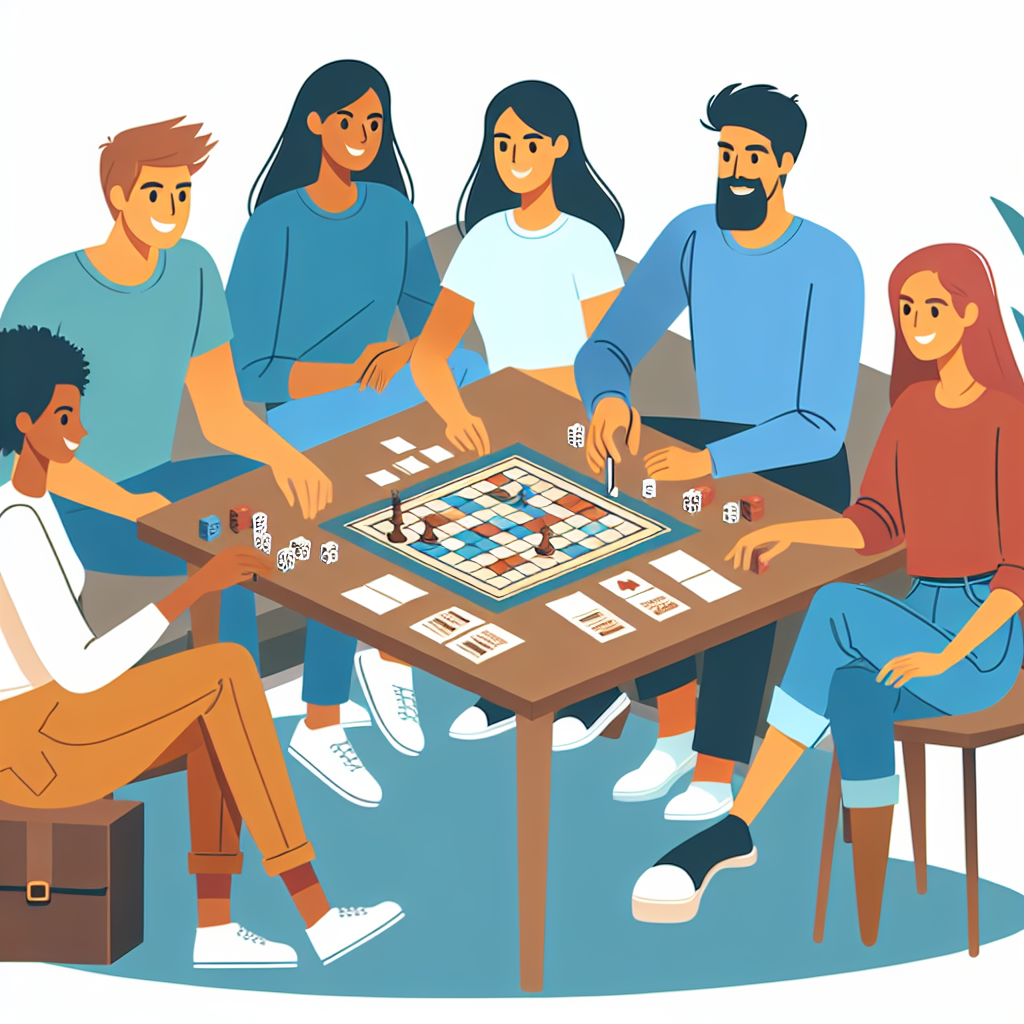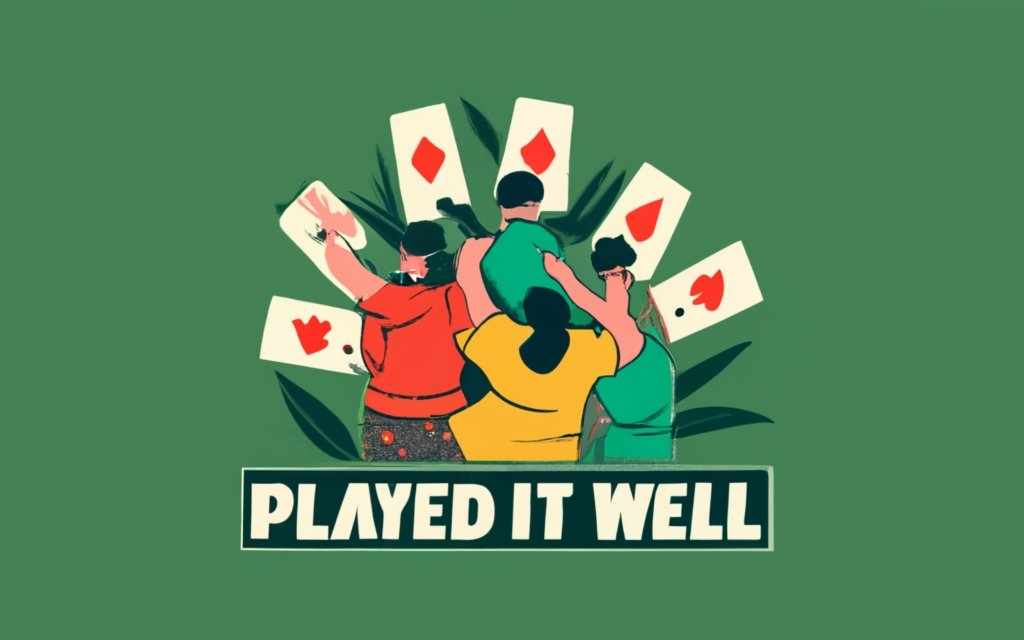If you’re looking for a fun and exciting way to spend quality time with family and friends, look no further than casual board games. These entertaining games have gained popularity in recent years, captivating players of all ages and backgrounds. Whether you’re a seasoned board game enthusiast or new to the world of gaming, casual board games offer a delightful escape from the daily grind, providing endless enjoyment and laughter for everyone involved. So gather your loved ones, roll the dice, and let the fun begin! Whether you’re a seasoned board game enthusiast or someone looking to dip their toes into the world of tabletop gaming, casual board games are a fantastic option for a fun and engaging activity. With a wide variety of game types and mechanics to choose from, there’s something for everyone to enjoy. In this article, we’ll explore different game types, discuss the benefits of playing casual board games, introduce some popular titles, and provide tips for hosting a casual board game night. So, grab your favorite snacks and get ready to dive into the exciting world of casual board games!
Game Types
Party Games
One of the most popular types of casual board games are party games. These games are designed to bring people together and create a lively and entertaining atmosphere. From acting out hilarious scenarios to guessing games and quick-thinking challenges, party games are perfect for groups of friends or family gatherings. They often involve a combination of teamwork, laughter, and a dash of friendly competition.
Word Games
If you have a knack for language and enjoy a mental challenge, word games are a great choice. These games typically involve creating words or solving puzzles using letters and words. Scrabble, for example, is a classic word game where players strategically place letter tiles to form words and earn points. Word games can test your vocabulary, spelling skills, and ability to think quickly under pressure.
Strategy Games
For those who love strategic thinking and long-term planning, strategy games provide an immersive and intellectually stimulating experience. These games often involve resource management, decision-making, and maneuvering your way to victory. Popular strategy games like Catan and Ticket to Ride require players to carefully plan their moves, negotiate with opponents, and adapt their strategies based on changing circumstances.
Cooperative Games
If you prefer collaboration over competition, cooperative games offer a unique gaming experience. In these games, players work together as a team, pooling their resources and skills to overcome challenges and achieve a common goal. Cooperative games foster communication, camaraderie, and a sense of shared accomplishment. Whether it’s defending a castle from invading monsters or solving a mystery together, cooperative games encourage teamwork and cooperation.
Trivia Games
For trivia buffs and lovers of general knowledge, trivia games are an excellent choice. These games test your knowledge in various subjects, from history and pop culture to science and sports. Trivia games often come in the form of question and answer formats, and they can be played individually or in teams. They not only entertain and challenge, but they also serve as a great way to learn new facts and spark interesting conversations.
Benefits of Casual Board Games
Enhanced Social Interaction
Playing casual board games with others can greatly enhance your social interactions. It provides an opportunity to engage in meaningful conversations, laugh together, and bond over shared experiences. Whether you’re playing a cooperative game and working together towards a common goal or engaging in friendly competition, board games create moments of connection and joy that can strengthen relationships.
Improved Cognitive Skills
Engaging in casual board games can have numerous cognitive benefits. Many games require strategic thinking, problem-solving, and critical reasoning. These mental exercises help improve memory, concentration, and logical reasoning skills. Additionally, word games can enhance vocabulary and language skills, while trivia games can expand general knowledge and memory recall. Playing board games regularly can help keep your mind sharp and agile.
Stress Relief
Board games offer a fantastic way to unwind and escape from the pressures of daily life. They provide a fun and immersive experience that can help alleviate stress and promote relaxation. Engaging in gameplay challenges your mind and focuses your attention, allowing you to temporarily set aside worries and immerse yourself in the enjoyment of the game. The social aspect of board games also adds an element of camaraderie and laughter, further contributing to stress relief.
Promotes Creativity
Casual board games often require players to think outside the box and come up with creative strategies or solutions. They encourage imaginative thinking, problem-solving, and the ability to adapt to changing circumstances. Whether it’s devising a clever word combination in word games or finding innovative ways to achieve victory in strategy games, board games nurture your creative thinking skills and encourage you to see things from different perspectives.

This image is property of images.pexels.com.
Top Casual Board Games
Monopoly
Monopoly is a classic board game that has been enjoyed by generations of players. The game revolves around buying, selling, and trading properties to accumulate wealth and bankrupt opponents. With its iconic monopoly board, player tokens, and various strategies to employ, Monopoly offers endless hours of entertainment. However, be prepared for some friendly competition and the occasional intense negotiations as players vie for virtual supremacy.
Scrabble
Scrabble is a beloved word game that challenges players to create words from letter tiles and strategically place them on a game board. Players earn points based on the length and complexity of their words. Scrabble tests your vocabulary, spelling skills, and ability to strategically plan your moves to maximize your score. It’s a game that combines intellectual stimulation with fun and is perfect for word enthusiasts of all ages.
Catan
Catan, also known as Settlers of Catan, is a highly regarded strategy game that transports players to a fictional island where they vie for resources and build settlements. The game involves dice rolling, resource management, and strategic decision-making as players trade resources and compete for victory points. Catan is renowned for its replayability and the dynamic nature of its gameplay, making each session a unique experience.
Ticket to Ride
Ticket to Ride is a popular board game that combines strategy and railway building. Players collect colored train cards and use them to claim routes on a map, connecting cities to complete tickets and earn points. With its simple yet engaging gameplay mechanics and beautiful illustrations, Ticket to Ride offers an accessible and enjoyable gaming experience for players of all ages.
Codenames
Codenames is a thrilling word-based party game that tests your ability to communicate and think creatively. In this game, players are divided into teams and take on the roles of spymasters, giving one-word clues to their teammates to identify secret agents among a grid of codenames. Codenames offers an exciting blend of deduction, word association, and teamwork, resulting in moments of laughter and suspense.
Game Mechanics
Dice Rolling
Dice rolling is a common game mechanic used in many casual board games. Rolling dice introduces an element of chance and unpredictability to gameplay. It can determine movement, resource allocation, combat outcomes, or other random events. Dice rolling adds an exciting and suspenseful element, as players eagerly await the results that could determine their fate.
Card Drafting
Card drafting is a game mechanic that involves players selecting cards or tiles from a common pool and passing the remaining ones to the next player. This mechanic requires players to carefully consider their options, balance short-term gains with long-term strategies, and adapt their plans based on the cards they receive. Card drafting adds a layer of strategic decision-making and anticipation to the gameplay.
Tile Placement
Tile placement is a mechanic where players add tiles to a growing board or play area, creating a dynamic and evolving landscape. This mechanic can be found in many strategy games, where players strategically place tiles to gain control of territory or connect strategic locations. Tile placement introduces spatial reasoning and strategic thinking, as players must consider how their placement affects their own position as well as that of their opponents.
Worker Placement
Worker placement is a mechanic where players assign their limited number of workers to different locations on a board to perform actions. Each location offers a specific benefit, such as collecting resources, gaining special abilities, or scoring points. Worker placement games require careful planning, resource management, and timing. They often involve competition among players for limited spots, adding an element of strategy and tactical decision-making.
Cooperative Gameplay
Cooperative gameplay is a mechanic where players work together as a team, sharing resources and abilities to achieve a common goal. In cooperative games, players face challenges and obstacles that they must overcome collectively. Cooperation, communication, and strategic coordination are key to success. This mechanic fosters a sense of unity and promotes teamwork, making it an excellent choice for players who prefer collaboration over competition.

This image is property of images.pexels.com.
Setting Up a Game
Reading the Rules
Before diving into a casual board game, it’s important to read and understand the rules. Take the time to familiarize yourself with the objective of the game, the gameplay mechanics, and any special rules or conditions. Understanding the rules beforehand will make the setup and gameplay smoother and more enjoyable for everyone involved.
Organizing Components
Many board games come with numerous components, including cards, tokens, game boards, and player pieces. Before starting the game, take a few moments to organize and sort these components. Ensure that each player has their own set of pieces and that cards and tokens are easily accessible. Organizing components not only streamlines the setup process but also prevents confusion during gameplay.
Setting Up the Play Area
Designate a specific area for gameplay and set up the game board and any necessary accessories. Ensure that the play area provides enough space for players to comfortably interact with the game components. Consider factors such as lighting, table size, and seating arrangements. Creating a dedicated play area helps set the mood and enhances the overall gaming experience.
Assigning Player Roles
In some games, players may have different roles or character cards that define their unique abilities or objectives. Assign these roles to each player before starting the game. This ensures that everyone understands their responsibilities and can fully participate in the gameplay. Assigning roles also brings a sense of excitement and anticipation to the game, as players discover their unique abilities or secret objectives.
How to Play
Instructions and Objectives
At the beginning of each game, make sure all players understand the game’s instructions and objectives. Explain the main goal of the game and any additional conditions or milestones that need to be achieved. Providing a brief overview of the rules and objectives helps to set the context and ensures that everyone starts the game on the same page.
Turn Order
Most casual board games have a specific turn order that rotates among the players. Determine the starting player, and then proceed clockwise or counterclockwise. Clearly communicate the turn order to avoid confusion during gameplay. Pay attention to any special rules or conditions that may affect the turn order, such as certain abilities that allow players to alter the order.
Gameplay Examples
To help new players understand the gameplay mechanics, consider providing examples or demonstrations of how the game is played. Walk through a few rounds or turns, highlighting key actions and decisions that players will encounter. This hands-on approach allows players to grasp the flow of the game and start playing with more confidence.

This image is property of images.pexels.com.
Tips for Hosting a Casual Board Game Night
Plan Ahead
Hosting a casual board game night requires some preparation. Before the event, decide on the date, time, and location. Consider the number of players, the duration of the games you plan to play, and any specific game preferences or themes. Inform your guests well in advance and provide them with the necessary details, such as which games will be played and any specific requirements (e.g., if they need to bring their own copy of a game).
Choose Games Wisely
When selecting games for a casual board game night, consider the preferences and skill levels of your guests. Choose games that have accessible rules, can accommodate the number of players attending, and offer a variety of gameplay experiences. It’s also beneficial to include a mix of game types, such as party games for laughter-inducing moments and strategy games for those seeking more intellectually stimulating challenges.
Create a Comfortable Space
To ensure a pleasant and engaging gaming experience, create a comfortable space for your guests. Arrange seating that allows everyone to interact easily and comfortably without hindering gameplay. Consider factors such as lighting, temperature, and noise levels. A cozy and welcoming environment will contribute to the overall enjoyment of the board game night.
Provide Snacks and Drinks
Snacks and drinks are an essential component of any board game night. Offer a selection of finger foods, beverages, and refreshments that can be enjoyed during gameplay. Consider providing a mix of options to accommodate different dietary preferences and restrictions. Having snacks and drinks readily available keeps energy levels up and provides opportunities for breaks and socializing.
Encourage Friendly Competition
While some games can be highly competitive, it’s important to foster a friendly and welcoming atmosphere. Encourage players to enjoy the experience rather than focusing solely on winning. Emphasize good sportsmanship, fair play, and respect for others. Friendly banter and lightheartedness add to the fun and create memorable moments during the game night.
Incorporating Casual Board Games in Social Gatherings
Family Gatherings
Casual board games are a fantastic addition to family gatherings, bringing generations together for shared experiences and quality time. Choose games that are accessible to different age groups and offer opportunities for teamwork and collaboration. Family gatherings are a great chance to introduce younger family members to the joy of board games and create lasting memories.
Birthday Parties
Birthday parties are another occasion where casual board games can be a hit. Whether it’s a children’s birthday party or an adult celebration, board games provide entertainment and stimulate social interaction. Consider selecting games that align with the age range and interests of the attendees. Incorporating board games into birthday parties adds an extra layer of fun and creates a memorable and enjoyable experience for all.
Game Nights with Friends
Game nights with friends offer a relaxed and enjoyable setting to socialize and have fun. Casual board games can be the centerpiece of these gatherings, providing hours of entertainment and laughter. Choose games that cater to the interests and preferences of your friends and offer a mix of competitive and cooperative gameplay. Game nights with friends create opportunities to strengthen bonds, create new inside jokes, and indulge in friendly rivalry.

Finding Players
Local Game Stores
Local game stores are excellent places to find fellow board game enthusiasts and potential players for casual board games. Many game stores organize game nights or gaming events where players can gather and try out different games. These events provide opportunities to connect with like-minded individuals, discover new games, and expand your gaming community.
Online Communities
Online communities dedicated to board games are a great resource for finding players. Websites, forums, and social media groups focused on board games offer platforms for connecting with individuals who share your passion for gaming. Join these communities, participate in discussions, and seek out local players or online gaming groups who are interested in casual board games.
Social Media Groups
Social media platforms, such as Facebook, have numerous groups specifically dedicated to board games. These groups often cater to specific regions or interests, allowing you to connect with local players or individuals who share similar gaming preferences. Engage with these communities, post inquiries about casual board game meetups, and make connections with fellow players.
Expanding Your Collection
Researching New Games
When it comes to expanding your collection of casual board games, research is key. Look for game reviews, watch gameplay videos, and read player feedback to get a sense of the games that align with your preferences. Consider factors such as game length, complexity, player count, and theme when selecting new games. Online platforms, such as BoardGameGeek, provide comprehensive information and user reviews for thousands of board games.
Board Game Subscription Services
Board game subscription services offer a convenient way to discover and try out new games regularly. These services typically deliver a curated selection of games to your doorstep on a monthly or quarterly basis. Subscribing to such services introduces you to a variety of casual board games and eliminates the guesswork of selecting new titles. It’s a great way to explore different game genres and broaden your gaming horizons.
Attending Game Conventions
Game conventions bring together gaming enthusiasts from all walks of life and offer an excellent opportunity to expand your collection. These conventions feature a wide range of exhibitors, allowing you to explore and try out new games firsthand. You can interact with publishers, fellow gamers, and industry professionals to get recommendations and learn about upcoming releases. Attending game conventions is an exciting and immersive experience that can lead to discovering hidden gems and connecting with fellow enthusiasts.
Casual board games offer a world of endless entertainment and joy. With diverse game types, immersive mechanics, and a wide range of titles to choose from, there’s something for everyone. Whether you’re looking to enhance social interactions, improve cognitive skills, relieve stress, or spark creativity, casual board games provide a fun and engaging way to connect with others and enjoy quality time. So gather your friends and family, dust off your game collection, and embark on a memorable adventure in the world of casual board games!






